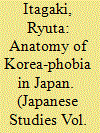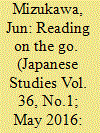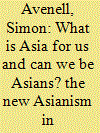| Srl | Item |
| 1 |
ID:
140345


|
|
|
|
|
| Summary/Abstract |
This article explores the history and theoretical implications of Korea-phobia in Japan, focusing on hate incidents such as a demonstration by the Zaitokukai group which hoisted flags and blasted hate speech through a loudspeaker at an elementary school for Korean children in Kyoto in 2009. An analysis of such speech reveals that these actions are not so new, and instead rely on what we might call the historical layers of Korea-phobia in Japan. Korea-phobia in contemporary Japan must be understood from a historical perspective that traces anti-Korean racism back to the opening decade of the twentieth century when Japan seized Korea as a colony.
|
|
|
|
|
|
|
|
|
|
|
|
|
|
|
|
| 2 |
ID:
140347


|
|
|
|
|
| Summary/Abstract |
The literature on education in Japan typically focuses attention on achievements in the classroom. In this study, I cross the border of scholarly attention to bukatsu (extracurricular school clubs), including their demanding schedules and mandatory activities, to analyze their rich roles in preparing students for future jobs. Refocusing attention from the classroom to the playground blurs hierarchies of activity and suggests a more holistic view of education. Drawing from extensive fieldwork in Japan that includes interviews and participant observation, I locate the value of bukatsu as generating a specific type of embodied cultural capital that is explicitly requested during the hiring process in the adult work world. The bukatsu experience reinforces certain attitudes that correspond with the bu (‘warrior’) part of the old bunburyōdō (‘the way of both pen and sword’) ideal. This research demonstrates the limits of academic credentials (i.e., test scores) in achieving larger societal goals. What seems to matter increasingly in a shrinking job market are dispositions derived from long-term participation in sports organizations, gained specifically through the institution of bukatsu.
|
|
|
|
|
|
|
|
|
|
|
|
|
|
|
|
| 3 |
ID:
143817


|
|
|
|
|
| Summary/Abstract |
This paper investigates the popularity of hula in contemporary Japanese society in order to understand how Native Hawaiian images and traditions play a role in constructing the image of a ‘paradise’ in Hawai`i. By drawing on the personal experience of the author as a participant observer in hula lessons and performance in Tokyo, it argues that aiming for the sense of cultural authenticity is integral to the Japanese practitioners’ attraction to hula. It also shows how Native Hawaiian hula teachers and performers skillfully appropriate the Japanese desire to discover an ‘authentic’ Hawai`i for their cultural as well as personal gain. Today’s Japanese discourse of ‘Hawai`i as paradise’ derives from the contemporary socio-cultural context of a Japanese society that longs for the authentic culture of the indigenous ‘other’ as well as from the shrewd use of that longing by the ‘other.’
|
|
|
|
|
|
|
|
|
|
|
|
|
|
|
|
| 4 |
ID:
147067


|
|
|
|
|
| Summary/Abstract |
In Japan the average age of first marriage continues to rise steadily, and people are spending a greater proportion of their adult life single. This is despite the fact that the vast majority of singles express desire to marry one day. The reasons for the rise in late and non-marriage are varied and complex, but difficulty in finding an appropriate or compatible partner has emerged as one of the key issues. Against this backdrop, the konkatsu (‘marriage-partner hunting’) industry has emerged, ostensibly to assist singles to find marriage partners.
|
|
|
|
|
|
|
|
|
|
|
|
|
|
|
|
| 5 |
ID:
147070


|
|
|
|
|
| Summary/Abstract |
This article examines the phenomenon of the cellphone novel in contemporary Japan. In contrast to dominant approaches that have focused on questions of literary merit, I explore the tempos and temporalities of the cellphone novel as reading ‘on the go’. Drawing on ethnographic accounts, I attempt to develop the notion of reading ‘on the go’ so that we may move beyond prevailing discussions of cellphone novels, which have focused mainly on the literary sophistication, or lack thereof, of cellphone novels and novelists. Additionally, I argue that there is underlying tension between ‘literature’ and ‘Literature’ vis-à-vis questions of ‘proper’ reading tempos among Japanese readers. In order to explore the political, ideological, and aesthetic ramifications of changing reading and writing practices, this article places the twenty-first century controversy over cellphone novels in dialogue with a historical precedent, the early modern literary movement known as the unification of spoken and written Japanese (genbun itchi). In so doing, the article examines a corollary relation between changes in literary trends and spatiotemporal transformations that provide a reading and writing environment. Ultimately, the article suggests that the ongoing spatiotemporal reconfigurations and negotiations prompted by the evolving digital media communication network, its infrastructure, and accompanying commercial industries play a critical role in informing how contemporary practices of reading and writing take shape.
|
|
|
|
|
|
|
|
|
|
|
|
|
|
|
|
| 6 |
ID:
141085


|
|
|
|
|
| Summary/Abstract |
This paper traces the development of the ‘New Asianism’ in Japan over the past quarter of a century. It identifies three broad trajectories or normative positions in the debate: those advocating the replication of a Japanese model in Asia, those in favour of a genuine community of equals, and those who see Asia as the only future for Japan and as a solution for the country's economic and social problems. The paper argues that the evolution and shifting prominence of each trajectory over time is indicative of the ways globalization and regionalization are impinging on imaginations of the nation and facilitating novel perspectives on East Asia in Japan. Although the nation-state is, and will probably remain, an important force behind Japan's relations in Asia for the foreseeable future, the New Asianism may be indicative of its gradual relativization and the beginning of a new, more multidimensional understanding of Asia in Japan.
|
|
|
|
|
|
|
|
|
|
|
|
|
|
|
|